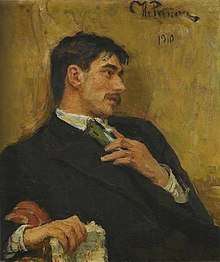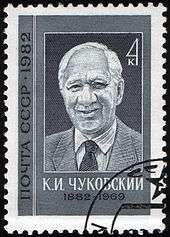Korney Chukovsky
Korney Ivanovich Chukovsky (Russian: Корне́й Ива́нович Чуко́вский, IPA: [kɐrˈnʲej ɪˈvanəvʲɪtɕ tɕʊˈkofskʲɪj] (![]()
Korney Chukovsky | |
|---|---|
 Portrait by Ilya Repin. | |
| Born | Nikolay Vasilyevich Korneychukov 31 March 1882 Saint Petersburg, Russian Empire |
| Died | 28 October 1969 (aged 87) Moscow, Russian SFSR, Soviet Union |
| Occupation | Poet, writer, translator, literary critic, journalist |
Early life
He was born Nikolay Vasilyevich Korneychukov (Russian: Николай Васильевич Корнейчуков), which he reworked into his now familiar pen-name while working as a journalist at Odessa News in 1901. He was born in St. Petersburg, the illegitimate son of Ekaterina Osipovna Korneychukova (a peasant girl from the Poltava region of Ukraine) and Emmanuil Solomonovich Levenson, a man from a wealthy Jewish family (his legitimate grandson was mathematician Vladimir Rokhlin). Levenson's family did not permit his marriage to Korneychukova and the couple eventually was forced to separate. Korneychukova moved to Odessa with her two children, Nikolay and his sister Marussia.[3] Levenson supported them financially for some time, until his marriage to another woman. Nikolay studied at the Odessa gymnasium, where one of his classmates was Vladimir Zeev Jabotinsky. Later, Nikolay was expelled from the gymnasium for his "low origin" (a euphemism for illegitimacy). He had to get his secondary school and university diplomas by correspondence.
He taught himself English and, in 1903–05, he served as the London correspondent at an Odessa newspaper, although he spent most of his time at the British Library instead of the press gallery in the Parliament. Back in Russia, Chukovsky started translating English works, notably Walt Whitman, and published several analyses of contemporary European authors, which brought him in touch with leading personalities of Russian literature and secured the friendship of Alexander Blok. Chukovsky's English was not idiomatic as he had taught himself to speak it by reading and he thus pronounced English words in a distinctly odd manner, and it was difficult for people to understand him in England.[4] His influence on Russian literary society of the 1890s is immortalized by satirical verses of Sasha Cherny, including Korney Belinsky (an allusion to the famous critic Vissarion Belinsky). Later he published several notable literary titles including From Chekhov to Our Days (1908), Critique stories (1911) and Faces and masks (1914). He also published a satirical magazine called Signal (1905–1906) and was arrested for "insulting the ruling house," but was acquitted after six months of investigative incarceration.
Later life and works
It was at that period that Chukovsky produced his first fantasies for children. The girl from his famous novel 'The Crocodile' was inspired by Lyalya, daughter of his long-time friend, publisher Zinovii Grzhebin.[5] As the 2004 Encyclopædia Britannica put it, "clockwork rhythms and air of mischief and lightness in effect dispelled the plodding stodginess that had characterized pre-revolutionary children's poetry." Subsequently, they were adapted for theatre and animated films, with Chukovsky as one of the collaborators. Sergei Prokofiev and other composers even adapted some of his poems for opera and ballet. His works were popular with emigre children as well, as Vladimir Nabokov's complimentary letter to Chukovsky attests.
During the Soviet period, Chukovsky edited the complete works of Nikolay Nekrasov and published From Two to Five (1933), a popular guidebook to the language of children. As his invaluable diaries attest, Chukovsky used his popularity to help the authors persecuted by the regime including Anna Akhmatova, Mikhail Zoshchenko, Alexander Galich and Aleksandr Solzhenitsyn. He was the only Soviet writer who officially congratulated Boris Pasternak on winning the Nobel Prize. His daughter, Lydia Chukovskaya, is remembered as a noted writer, memoirist, philologist and lifelong assistant and secretary of the poet Anna Akhmatova. Chukovsky's son Nikolai was a military writer, his son Boris lost his life while serving in the army during World War II, and his daughter Maria died in her childhood from tuberculosis.

At one point his writings for children were under severe criticism. Nadezhda Krupskaya was an initiator of this campaign, but criticism also came also from children's writer Agniya Barto.
Starting in the 1930s, Chukovsky lived in the writers' village of Peredelkino near Moscow, where he is now buried.
For his works on the life of Nekrasov he was awarded a Doctor of Science degree in philology. He also received the Lenin Prize in 1962 for his book, Mastery of Nekrasov and an honorary doctorate from Oxford University in 1962.
References
- "Archived copy". Archived from the original on 2012-04-13. Retrieved 2014-07-23.CS1 maint: archived copy as title (link)
- Madrid, Anthony (2020-02-19). "Russia's Dr. Seuss". The Paris Review. Retrieved 2020-02-20.
- http://www.radiosvoboda.org/content/article/27518201.html
- Goloperov, Vadim. "Korney Chukovsky: Odessa's Famous And Also Unknown Writer". The Odessa Review. Retrieved 30 November 2016.
- Ippolitov 2003.
Sources
- Ippolitov, S. S. (2003). "Гржебин Зиновий Исаевич (1877 1929)" [Grzhebin Zinovii Isaevich (1877 1929)] (in Russian). The New Historical Bulletin. Cite journal requires
|journal=(help)
External links
| Wikimedia Commons has media related to Korney Chukovsky. |
Works by Chukovsky
- Popular works by Chukovsky , at Ryfma.com (in Russian)
- Живой как жизнь ('Alive as life itself'), a humorous and anti-prescriptivist discussion of the Russian language (in Russian)
- Selected works of Chukovsky, at the Stikhiia poetry archive (in Russian)
Works about Chukovsky
- Chukfamily.ru Materials about three generations of the Chukovsky family: Korney, Lidiya and Elena (in Russian)
- Biography of Chukovsksy (in Russian)
- "On the 120th Anniversary of Chukovsky's Birth", by essayist Dmitrii Bykov (in Russian)